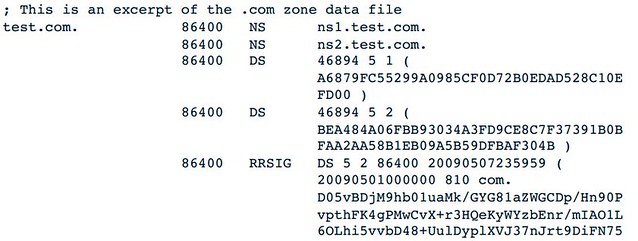DNS Security- "DNSSEC"
DNSSEC guarantee authenticity , Integrity by injecting digital signatures into the DNS hierarchy for each levels of domain names.
As in the real world our signature is a mandatory one while sending a letter or for Bank transactions ect.. as a proof to authenticate our identity in order to prevent fraudulent transactions. For that we have to register our signature with the bank or to the corresponding authority, so for every transaction that authority checks whether the signature provided matches with the one registered and thus authorize .
This is the same case in
"DNS Security Extension" provides message authentication and integrity verifcation through
"Cryptographic" and
"Digital signatures".
When DNSSEC Signs a Zone file in the DNS , the following are the entries or records that are added to the zone.
RRSIG RECORD
A zone’s private key signs each resource record set.
RRset’s digital signature is stored in an "RRSIG" record.
RRSIG record’s fields: A- the type of records signed.
A- the type of records signed.
5- the digital signature algorithm used (RSA with SHA1)
3- the number of labels in the signed name
86400-the original time-to-live on the records signed
20090507235959-when the signature expires
20090501000000- when the records were signed
41148-the key ID/tag/footprint
test.com.- the signer’s name
Finally, the "digital signature" itself in base64 .================================================================================
DNSKEY RECORD
1.In DNSSEC, each zone has a public/private key pair.
2.The zone’s public key is stored in the new "DNSKEY" record.
3.The zone’s private key is kept safe locally. DNSKEY record’s fields:
DNSKEY record’s fields:
256 - the 16-bit flags field:
3- the protocol octet will always be 3 to signify DNSSEC.
5-the DNSKEY algorithm number================================================================================
NSEC Record
NSEC records are designed to prove that no records exist between two different points.
Each NSEC record has a corresponding "RRSIG". [/b]
 This record says that nothing exists between the "east.test.om." record and the record "ns.east.test.com." exists i.e if someone tries to convince that "s.east.test.com." exist we can verify it by checking the "RRSIG" .
This record says that nothing exists between the "east.test.om." record and the record "ns.east.test.com." exists i.e if someone tries to convince that "s.east.test.com." exist we can verify it by checking the "RRSIG" .================================================================================
Delegation Signer (DS) Records
 DS record’s fields:
DS record’s fields:
46894-the key tag
5-the DNSKEY algorithm number (RSA with SHA1)
2 -the digest type , 2 is SHA-256 , 1 is SHA-1.
Finally, the digest, in hexadecimal
This “DS record” at the parent name server is what binds your signed domain into the larger “chain of trust.
================================================================================
To add a DS record to the Registrar:
Copy the following DS record information from the hosting provider and add it to the Registrar DS record:
1.Key tag
2.Algorithm.
3.Digest Type.
4.Digest